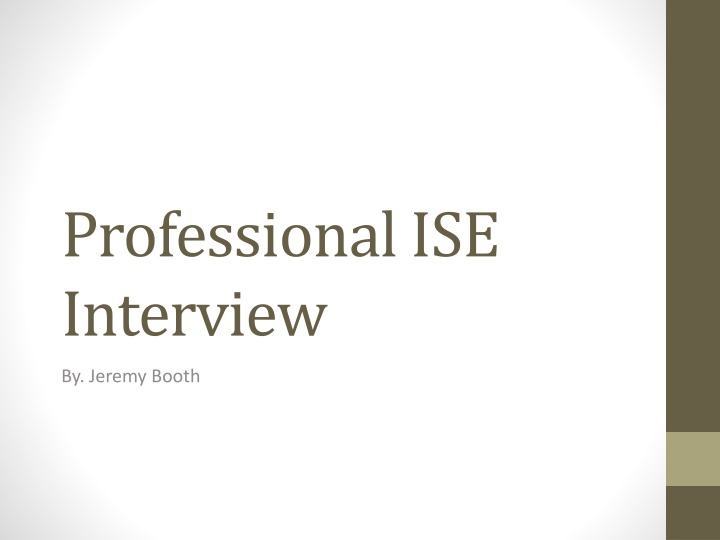
Insights from a Professional Industrial Engineer Interview at Fidelity National Financial
Gain valuable insights from an interview with Mr. Ryan King, a risk analyst at Fidelity National Financial. Explore his educational background, work environment, skills essential for his job, and more. Discover the challenges and rewards of the profession as well as his career growth experiences.
Uploaded on | 1 Views
Download Presentation

Please find below an Image/Link to download the presentation.
The content on the website is provided AS IS for your information and personal use only. It may not be sold, licensed, or shared on other websites without obtaining consent from the author. If you encounter any issues during the download, it is possible that the publisher has removed the file from their server.
You are allowed to download the files provided on this website for personal or commercial use, subject to the condition that they are used lawfully. All files are the property of their respective owners.
The content on the website is provided AS IS for your information and personal use only. It may not be sold, licensed, or shared on other websites without obtaining consent from the author.
E N D
Presentation Transcript
Professional ISE Interview By. Jeremy Booth
Mr. Ryan King Currently works at Fidelity National Financial Job Description: Risk analyst
Educational Background Did you graduate from Mercer and if so when? Yes, December 2014 What degree did you earn? Industrial Engineer Have you earned any licenses/certifications such as Professional Engineer, Black Belt, Certified Quality Engineer, etc.? No Did you pursue a Master s degree after graduation? If so on average how much time would you say a Master s requires for completion? Do you feel that having a Master s degree helped you advance in your career? No Did you have any internships or co-ops while you were at Mercer? If so, where did you intern and what were your duties? Yes, I had an internship at Fidelity National Financial, and my duties were to forecast the opened claims rate for the Company.
Work Environment What is your routine on a normal day at work? I get to the office around 7:15 am and leave around 4:45 pm. What skills would you say were essential to your job? My analytical mind and my critical thinking skills. Are your benefits and compensation competitive with those in similar industries or jobs? Yes.
Work Environment (Continued) How many hours on average do you work a week? 45-50 How much free time do you have when you leave work? Do you usually work on weekends? About 5 hours. Depends on the time of the year. How often do you interact with people outside of the engineering world? Every day.
Work Environment (Continued) Are you required to make presentations and write reports as part of your job? I am required to present my work and write reports constantly. How would you compare your job experience so far to what you expected before you actually started to work; is your job experience what you expected or is the experience completely different? It s different. My company culture is more laid back than I was expecting. Do you usually work in groups or alone? I usually work in groups.
Work Environment (Continued) What is a stressful aspect of your job and what is a satisfying aspect of your job? Stressful - We are currently implementing a GRC tool (governance, risk management, and compliance), which is adding onto our current responsibilities. Satisfying The sense of accomplishment when the solutions that I recommend are implemented into the process. Have you had any mentors who were influential in helping you grow in your profession? Yes, my boss from my internship with the company is still extremely influential in my growth as a professional. How much room for advancement or promotion is there available at your current company? A solid amount. Is traveling a requirement of the position you hold and if so how often do you travel and where? Yes, but not a lot. We have to travel about once every couple of months. We travel to our subsidiaries and analyze the risks that they face and the controls that they have in place. Virginia Beach, Irvine California, Denver, Dallas, etc.
Mercer Education Experience How well did your Mercer education prepare you for your career? My education at Mercer taught me to problem solve, but the actual courses are very different from what I do now. Which classes that you took in college do you find to be most helpful on your job? Statistics has definitely been helpful. Also, learning Lean for Process Improvement. Operations Research. Which classes were least helpful? Machine Shop although that was a lot of fun.
Career Choice/Career Path What has been your career path since graduation? I worked as a consultant for FNF to optimize their claims processing system and then when I finished my assessment I became a risk analyst. Has your family life (marriage, children, parents, etc) influenced your career path? My parents wanted me to be an engineer. What made you choose your specialty in the engineering field? My high school statistics teacher thought I was good at statistics and recommended ISE.
Career Choice/Career Path (Continued) If given the opportunity, would you could go back in time and change your major or specialization? Why or why not? No because being an IE can give you a wide arrange of possible positions. You can work as an engineer or as a business person. Where do you see yourself 5 to 10 years from now? Probably still here, but making more.
Permission to Publish Responses Do you give us your permission to publish your contact information on Dr. Burtner s website? Yes Do you give us your permission to publish your interview responses on Dr. Burtner s website? Yes
